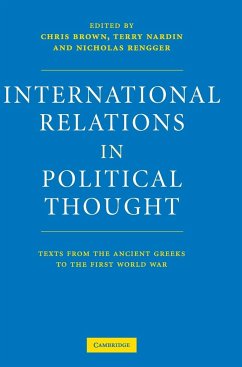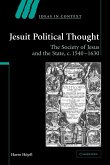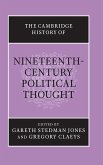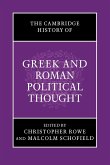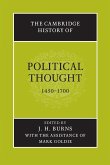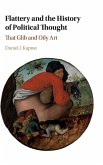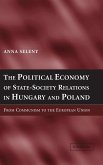Chris Brown / Terry Nardin / Nicholas Rengger (eds.)
International Relations in Political Thought
Herausgeber: Brown, Chris; Rengger, Nicholas; Nardin, Terry
Chris Brown / Terry Nardin / Nicholas Rengger (eds.)
International Relations in Political Thought
Herausgeber: Brown, Chris; Rengger, Nicholas; Nardin, Terry
- Gebundenes Buch
- Merkliste
- Auf die Merkliste
- Bewerten Bewerten
- Teilen
- Produkt teilen
- Produkterinnerung
- Produkterinnerung
Thinkers from the Classical Greeks to the First World War are represented in this collection of key international relations texts.
Andere Kunden interessierten sich auch für
![Jesuit Political Thought Jesuit Political Thought]() Harro H. PflJesuit Political Thought70,99 €
Harro H. PflJesuit Political Thought70,99 €![Foundations of Modern International Thought Foundations of Modern International Thought]() David ArmitageFoundations of Modern International Thought34,99 €
David ArmitageFoundations of Modern International Thought34,99 €![The Cambridge History of Nineteenth-Century Political Thought The Cambridge History of Nineteenth-Century Political Thought]() The Cambridge History of Nineteenth-Century Political Thought138,99 €
The Cambridge History of Nineteenth-Century Political Thought138,99 €![The Cambridge History of Greek and Roman Political Thought The Cambridge History of Greek and Roman Political Thought]() Simon Harrison / Melissa LaneThe Cambridge History of Greek and Roman Political Thought83,99 €
Simon Harrison / Melissa LaneThe Cambridge History of Greek and Roman Political Thought83,99 €![The Cambridge History of Political Thought 1450 1700 The Cambridge History of Political Thought 1450 1700]() Mark GoldieThe Cambridge History of Political Thought 1450 170083,99 €
Mark GoldieThe Cambridge History of Political Thought 1450 170083,99 €![Flattery and the History of Political Thought Flattery and the History of Political Thought]() Daniel J. KapustFlattery and the History of Political Thought76,99 €
Daniel J. KapustFlattery and the History of Political Thought76,99 €![The Political Economy of State-Society Relations in Hungary and Poland The Political Economy of State-Society Relations in Hungary and Poland]() Anna SelenyThe Political Economy of State-Society Relations in Hungary and Poland89,99 €
Anna SelenyThe Political Economy of State-Society Relations in Hungary and Poland89,99 €-
-
-
Thinkers from the Classical Greeks to the First World War are represented in this collection of key international relations texts.
Hinweis: Dieser Artikel kann nur an eine deutsche Lieferadresse ausgeliefert werden.
Hinweis: Dieser Artikel kann nur an eine deutsche Lieferadresse ausgeliefert werden.
Produktdetails
- Produktdetails
- Verlag: Cambridge University Press
- Seitenzahl: 630
- Erscheinungstermin: 4. Januar 2016
- Englisch
- Abmessung: 250mm x 175mm x 38mm
- Gewicht: 1250g
- ISBN-13: 9780521573306
- ISBN-10: 0521573300
- Artikelnr.: 28090226
- Herstellerkennzeichnung
- Libri GmbH
- Europaallee 1
- 36244 Bad Hersfeld
- gpsr@libri.de
- Verlag: Cambridge University Press
- Seitenzahl: 630
- Erscheinungstermin: 4. Januar 2016
- Englisch
- Abmessung: 250mm x 175mm x 38mm
- Gewicht: 1250g
- ISBN-13: 9780521573306
- ISBN-10: 0521573300
- Artikelnr.: 28090226
- Herstellerkennzeichnung
- Libri GmbH
- Europaallee 1
- 36244 Bad Hersfeld
- gpsr@libri.de
CHRIS BROWN is Professor of International Relations at the London School of Economics. His publications include International Relations Theory: New Normative Approaches (1992), Understanding International Relations (1997), An Introduction to International Political Theory (forthcoming). He also edited Political Restructuring in Europe: Ethical Perspectives (1994).
Acknowledgements
1. Introduction
2. Ancient thought (500 BCE-312 CE): Thucydides, from History of the Peloponnesian War
Aristotle, from The Politics
Cicero, from On Duties
Marcus Aurelius, from Meditations
Plato, from The Epistles
3. Late antiquity and the early Middle Ages (312-1000): Anonymous, from The Teaching of the Lord to the Gentiles through the Twelve Apostles or The Didache
Eusebius, from Tricennial Orations
Augustine, from The City of God Against the Pagans
Constantine Porphyrogenitus, from De Administrando Imperio
Al-Farabi, from The Political Regime
Avicenna, from The Healing
Moses Maimonides, from Logic
4. International relations in Christendom: John of Paris, from On Royal and Papal Power
Dante Alighieri, from Monarchy
Martin Luther, from On Secular Authority
Thomas Aquinas, from Summa Theologiae
Desiderius Erasmus, from 'Dulce Bellum Inexpertis'
Francisco de Vitoria, from 'On the American Indians'
5. The modern European state and system of states: Niccolò Machiavelli, from The Prince and The Discourses
Jean Bodin, from Six Books of the Commonwealth
François de Callières, from On the Manner of Negotiating with Princes
Cornelius van Bynkershoek, from On Questions of Public Law
Alexander Hamilton, from Letters of Pacificus
Edmund Burke, from Letters on a Regicide Peace
François de Salignac de la Mothe Fénelon, from 'On the Necessity of Forming Alliances'
Friedrich von Gentz, from 'The True Concept of a Balance of Power'
6. The emergence of International Law: Hugo Grotius, from The Law of War and Peace
Thomas Hobbes, from Leviathan
Samuel Pufendorf, from On the Duties of Man and Citizen
Samuel Rachel, from 'On the Law of Nations'
Christian von Wolff, from The Law of Nations Treated According to a Scientific Method
Emmerich de Vattel, from The Law of Nations or Principles of Natural Law
7. The Enlightenment: the Abbé de Saint-Pierre, from A Project for Settling an Everlasting Peace in Europe
Montesquieu, from The Spirit of the Laws
David Hume, from Of the Balance of Power
Adam Smith, from The Wealth of Nations
Jean-Jacques Rousseau, from The State of War and Abstract and Judgement of Saint-Pierre's Project for Perceptual Peace
Immanuel Kant, from Essay on Theory and Practice, Perpetual Peace and The Metaphysical Elements of Right
8. State and nation in nineteenth-century international political theory: G. W. F. Hegel, from Elements of the Philosophy of Right
G. Mazzini, from On the Duties of Man
John Stuart Mill, from 'A Few Words on Non-intervention'
H. von Treitschke, from Politics
B. Bosanquet, from 'Patriotism in the Perfect State'
9. International relations and industrial society: Adam Smith, from The Wealth of Nations
David Ricardo, from 'On the Principles of Political Economy and Taxation'
Richard Cobden, from The Political Writings of Richard Cobden
Friedrich List, from The National System of Political Economy
Rudolf Hilferding, from Finance Capital
Karl Marx and Friedrich Engels, from 'The Communist Manifesto'
Joseph Schumpeter, from 'The Sociology of Imperialisms'
List of references
Index.
1. Introduction
2. Ancient thought (500 BCE-312 CE): Thucydides, from History of the Peloponnesian War
Aristotle, from The Politics
Cicero, from On Duties
Marcus Aurelius, from Meditations
Plato, from The Epistles
3. Late antiquity and the early Middle Ages (312-1000): Anonymous, from The Teaching of the Lord to the Gentiles through the Twelve Apostles or The Didache
Eusebius, from Tricennial Orations
Augustine, from The City of God Against the Pagans
Constantine Porphyrogenitus, from De Administrando Imperio
Al-Farabi, from The Political Regime
Avicenna, from The Healing
Moses Maimonides, from Logic
4. International relations in Christendom: John of Paris, from On Royal and Papal Power
Dante Alighieri, from Monarchy
Martin Luther, from On Secular Authority
Thomas Aquinas, from Summa Theologiae
Desiderius Erasmus, from 'Dulce Bellum Inexpertis'
Francisco de Vitoria, from 'On the American Indians'
5. The modern European state and system of states: Niccolò Machiavelli, from The Prince and The Discourses
Jean Bodin, from Six Books of the Commonwealth
François de Callières, from On the Manner of Negotiating with Princes
Cornelius van Bynkershoek, from On Questions of Public Law
Alexander Hamilton, from Letters of Pacificus
Edmund Burke, from Letters on a Regicide Peace
François de Salignac de la Mothe Fénelon, from 'On the Necessity of Forming Alliances'
Friedrich von Gentz, from 'The True Concept of a Balance of Power'
6. The emergence of International Law: Hugo Grotius, from The Law of War and Peace
Thomas Hobbes, from Leviathan
Samuel Pufendorf, from On the Duties of Man and Citizen
Samuel Rachel, from 'On the Law of Nations'
Christian von Wolff, from The Law of Nations Treated According to a Scientific Method
Emmerich de Vattel, from The Law of Nations or Principles of Natural Law
7. The Enlightenment: the Abbé de Saint-Pierre, from A Project for Settling an Everlasting Peace in Europe
Montesquieu, from The Spirit of the Laws
David Hume, from Of the Balance of Power
Adam Smith, from The Wealth of Nations
Jean-Jacques Rousseau, from The State of War and Abstract and Judgement of Saint-Pierre's Project for Perceptual Peace
Immanuel Kant, from Essay on Theory and Practice, Perpetual Peace and The Metaphysical Elements of Right
8. State and nation in nineteenth-century international political theory: G. W. F. Hegel, from Elements of the Philosophy of Right
G. Mazzini, from On the Duties of Man
John Stuart Mill, from 'A Few Words on Non-intervention'
H. von Treitschke, from Politics
B. Bosanquet, from 'Patriotism in the Perfect State'
9. International relations and industrial society: Adam Smith, from The Wealth of Nations
David Ricardo, from 'On the Principles of Political Economy and Taxation'
Richard Cobden, from The Political Writings of Richard Cobden
Friedrich List, from The National System of Political Economy
Rudolf Hilferding, from Finance Capital
Karl Marx and Friedrich Engels, from 'The Communist Manifesto'
Joseph Schumpeter, from 'The Sociology of Imperialisms'
List of references
Index.
Acknowledgements
1. Introduction
2. Ancient thought (500 BCE-312 CE): Thucydides, from History of the Peloponnesian War
Aristotle, from The Politics
Cicero, from On Duties
Marcus Aurelius, from Meditations
Plato, from The Epistles
3. Late antiquity and the early Middle Ages (312-1000): Anonymous, from The Teaching of the Lord to the Gentiles through the Twelve Apostles or The Didache
Eusebius, from Tricennial Orations
Augustine, from The City of God Against the Pagans
Constantine Porphyrogenitus, from De Administrando Imperio
Al-Farabi, from The Political Regime
Avicenna, from The Healing
Moses Maimonides, from Logic
4. International relations in Christendom: John of Paris, from On Royal and Papal Power
Dante Alighieri, from Monarchy
Martin Luther, from On Secular Authority
Thomas Aquinas, from Summa Theologiae
Desiderius Erasmus, from 'Dulce Bellum Inexpertis'
Francisco de Vitoria, from 'On the American Indians'
5. The modern European state and system of states: Niccolò Machiavelli, from The Prince and The Discourses
Jean Bodin, from Six Books of the Commonwealth
François de Callières, from On the Manner of Negotiating with Princes
Cornelius van Bynkershoek, from On Questions of Public Law
Alexander Hamilton, from Letters of Pacificus
Edmund Burke, from Letters on a Regicide Peace
François de Salignac de la Mothe Fénelon, from 'On the Necessity of Forming Alliances'
Friedrich von Gentz, from 'The True Concept of a Balance of Power'
6. The emergence of International Law: Hugo Grotius, from The Law of War and Peace
Thomas Hobbes, from Leviathan
Samuel Pufendorf, from On the Duties of Man and Citizen
Samuel Rachel, from 'On the Law of Nations'
Christian von Wolff, from The Law of Nations Treated According to a Scientific Method
Emmerich de Vattel, from The Law of Nations or Principles of Natural Law
7. The Enlightenment: the Abbé de Saint-Pierre, from A Project for Settling an Everlasting Peace in Europe
Montesquieu, from The Spirit of the Laws
David Hume, from Of the Balance of Power
Adam Smith, from The Wealth of Nations
Jean-Jacques Rousseau, from The State of War and Abstract and Judgement of Saint-Pierre's Project for Perceptual Peace
Immanuel Kant, from Essay on Theory and Practice, Perpetual Peace and The Metaphysical Elements of Right
8. State and nation in nineteenth-century international political theory: G. W. F. Hegel, from Elements of the Philosophy of Right
G. Mazzini, from On the Duties of Man
John Stuart Mill, from 'A Few Words on Non-intervention'
H. von Treitschke, from Politics
B. Bosanquet, from 'Patriotism in the Perfect State'
9. International relations and industrial society: Adam Smith, from The Wealth of Nations
David Ricardo, from 'On the Principles of Political Economy and Taxation'
Richard Cobden, from The Political Writings of Richard Cobden
Friedrich List, from The National System of Political Economy
Rudolf Hilferding, from Finance Capital
Karl Marx and Friedrich Engels, from 'The Communist Manifesto'
Joseph Schumpeter, from 'The Sociology of Imperialisms'
List of references
Index.
1. Introduction
2. Ancient thought (500 BCE-312 CE): Thucydides, from History of the Peloponnesian War
Aristotle, from The Politics
Cicero, from On Duties
Marcus Aurelius, from Meditations
Plato, from The Epistles
3. Late antiquity and the early Middle Ages (312-1000): Anonymous, from The Teaching of the Lord to the Gentiles through the Twelve Apostles or The Didache
Eusebius, from Tricennial Orations
Augustine, from The City of God Against the Pagans
Constantine Porphyrogenitus, from De Administrando Imperio
Al-Farabi, from The Political Regime
Avicenna, from The Healing
Moses Maimonides, from Logic
4. International relations in Christendom: John of Paris, from On Royal and Papal Power
Dante Alighieri, from Monarchy
Martin Luther, from On Secular Authority
Thomas Aquinas, from Summa Theologiae
Desiderius Erasmus, from 'Dulce Bellum Inexpertis'
Francisco de Vitoria, from 'On the American Indians'
5. The modern European state and system of states: Niccolò Machiavelli, from The Prince and The Discourses
Jean Bodin, from Six Books of the Commonwealth
François de Callières, from On the Manner of Negotiating with Princes
Cornelius van Bynkershoek, from On Questions of Public Law
Alexander Hamilton, from Letters of Pacificus
Edmund Burke, from Letters on a Regicide Peace
François de Salignac de la Mothe Fénelon, from 'On the Necessity of Forming Alliances'
Friedrich von Gentz, from 'The True Concept of a Balance of Power'
6. The emergence of International Law: Hugo Grotius, from The Law of War and Peace
Thomas Hobbes, from Leviathan
Samuel Pufendorf, from On the Duties of Man and Citizen
Samuel Rachel, from 'On the Law of Nations'
Christian von Wolff, from The Law of Nations Treated According to a Scientific Method
Emmerich de Vattel, from The Law of Nations or Principles of Natural Law
7. The Enlightenment: the Abbé de Saint-Pierre, from A Project for Settling an Everlasting Peace in Europe
Montesquieu, from The Spirit of the Laws
David Hume, from Of the Balance of Power
Adam Smith, from The Wealth of Nations
Jean-Jacques Rousseau, from The State of War and Abstract and Judgement of Saint-Pierre's Project for Perceptual Peace
Immanuel Kant, from Essay on Theory and Practice, Perpetual Peace and The Metaphysical Elements of Right
8. State and nation in nineteenth-century international political theory: G. W. F. Hegel, from Elements of the Philosophy of Right
G. Mazzini, from On the Duties of Man
John Stuart Mill, from 'A Few Words on Non-intervention'
H. von Treitschke, from Politics
B. Bosanquet, from 'Patriotism in the Perfect State'
9. International relations and industrial society: Adam Smith, from The Wealth of Nations
David Ricardo, from 'On the Principles of Political Economy and Taxation'
Richard Cobden, from The Political Writings of Richard Cobden
Friedrich List, from The National System of Political Economy
Rudolf Hilferding, from Finance Capital
Karl Marx and Friedrich Engels, from 'The Communist Manifesto'
Joseph Schumpeter, from 'The Sociology of Imperialisms'
List of references
Index.

